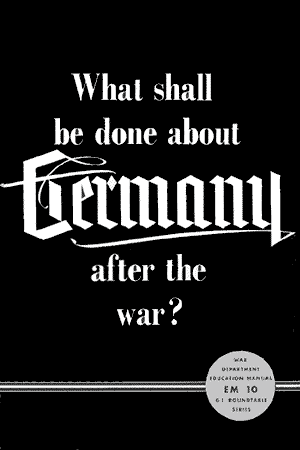By Arthur O. Lovejoy
Professor, Johns Hopkins University
(Published July 1944)
 Table of Contents
Table of Contents
What Was Done after the Last War?
What Caused Germany to Start Another War?
What Could Have Been Done about Germany after the Last War?
What Should Be Done, after Germany’s Defeat this Time?
Preventing Future German Aggression
Eliminating the Promoters of War
Punishment of German War Criminals
Can Germany Become a Free and Democratic Country?
Can Germany Become Peaceful and Law-Abiding?
Suggestions for Further Reading
Introduction
The purpose of this pamphlet is to put before citizens who are serving America in the Army some of the historical facts which bear on the question: What shall be done about Germany after this war? The pamphlet also attempts to do the following things:
- To suggest the principal purposes which most people agree we would like to accomplish, if we can, by our treatment of defeated Germany.
- To state different proposed means for accomplishing these purposes.
- To raise the question how far any action by us and our Allies can accomplish all of them.
Whatever is done will, of course, have to be done in agreement and cooperation with our Allies. But it is certain that the United States will have a great part in settling these issues, and it is therefore important that all Americans should have clear ideas on them.
This pamphlet is not intended to lay down any final conclusions on the subject, but to give readers some help in nderstanding the problems that are involved and the facts at bear upon those problems. It is designed to serve as background for thinking and discussion.
This is not a question merely about the future of Germany or even of Europe. It is a question also about the future of the United States.
America is now at war with Germany in consequence of certain things that happened in Germany in the twenty years from 1919 to 1939. If these things had not happened there, American soldiers would not now be fighting Germans. It is possible that things which will happen in Germany in the next twenty or thirty years may have the same result—that the sons of men now in the armed services may have to fight against Germans in a third and a still. more terrible war—unless we can prevent similar things from happening again.
The question, then, is: Can we do anything to prevent them from happening again, and if so, what? On this question we can perhaps get some light from considering what happened after the last war with Germany.
Related Resources

September 7, 2024
Travel and Trade in Later Medieval Africa

September 6, 2024
Sacred Cloth: Silk in Medieval Western Europe

September 5, 2024